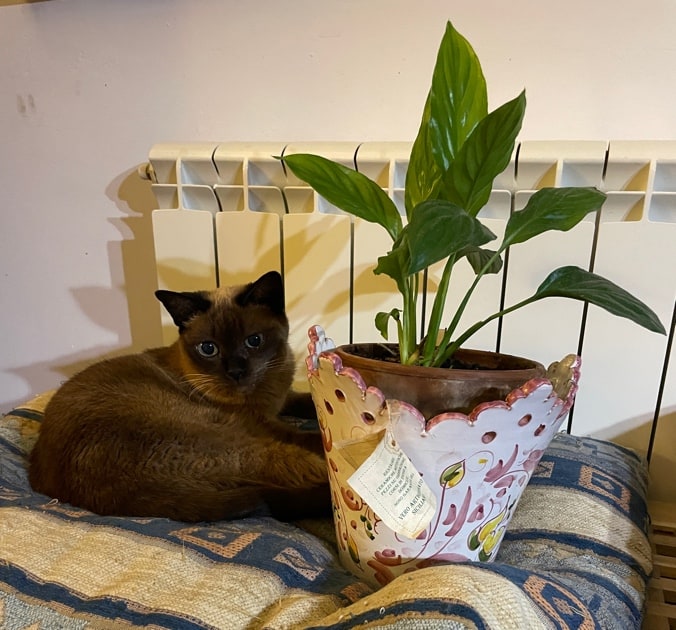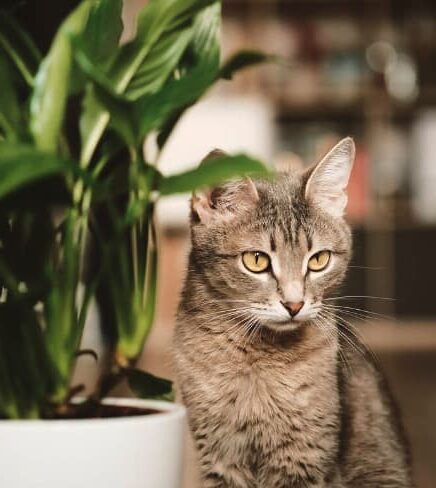Peace lilies are beautiful houseplants, but they can also be dangerous to cats. They’re not as dangerous as a true lily plant, but can can still be toxic.
Peace Lillies are known botanically as the Spathiphyllum sp. and also as Mauna Loa plants. Despite its common name, they are not true lilies or members of the Lilium (Lilies) or Hemerocallis (Daylilies) plant families, both of which can be lethal to cats.
The peace lily is a perennial plant that grows from bulbs. It has large white or yellowish flowers that bloom during summer. The leaves are dark green and oval shaped.
Are Peace Lilies Toxic to Cats?
The peace lily is poisonous to cats. If ingested, they can cause vomiting, diarrhea, weakness, seizures, coma, and even death. Unfortunately, there is no antidote for poisoning.
Members of the Araceae family, the Peace Lily is, nonetheless, mildly toxic to your favorite feline. This is because these houseplants have insoluble calcium oxalate crystals within various parts of the plant, like leaves and stems, that can cause painful reactions.
If your cat chews any part of this plant, the oxalate crystals will be absorbed by your cat’s soft tissues, causing an adverse reaction.

Calcium Oxalate Crystals
Calcium oxalate crystals are found in many houseplants and are the principal reason for kidney stones. The crystals themselves are a blend of oxalate that is found in many green leafy plants and vegetables, and calcium.
When these crystals of calcium oxalates are present in the body and there is not sufficient urine to flush them out, they will clump, causing kidney stones.
Kidney stones alone can be very painful. When ingested by your cat, they will cause a painful response with gastrointestinal symptoms and oral pain.
Signs and Symptoms of Peace Lily Poisoning in Cats
Considered toxic to cats by the ASPCA, all parts of the plant contain calcium oxalate crystals. If your cat bites a piece of stem or leaf, the oxalate crystals will be released into the mouth.
Oral irritation and intense burning sensations can occur, along with swelling. This can happen in the throat and digestive tract as well.
Occasionally, upper airway swelling can also occur, making it difficult for the cat to breathe. In severe reactions, breathing will not be possible.
If your feline chews or swallows any part of this plant, contact your local poison control authority or veterinarian immediately. A physical examination and proper treatment are needed.
Common signs and symptoms of oxalate crystal poisoning can include:
- Blistering inside the mouth or in the throat
- Diarrhea
- Drooling
- Excessive licking
- Lack of appetite
- Mouth or throat pain
- Nausea
- Pawing at the mouth
- Swelling
- Vomiting
- Stomach upset
The good news is that these poisoning cases are not likely to be severe because of the bitterness of the plants from by the crystals. The peace lily’s parts taste bitter, so cats may avoid taking a second bite and spit out the first bite quickly. That will limit the damage or discomfort to a localized and limited adverse reaction.
What Is the Treatment for Peace Lily Poisoning?
Should your cat experience a severe reaction with swelling, contact your veterinarian immediately. Do not try to induce vomiting unless your veterinarian instructs you to do so and how to do so.
Before veterinary treatment is available, you can do initial treatment to prevent a worse situation.
Remove any plant material that is still in your cat’s mouth. You can rinse the cat’s mouth or give your cat lactose-free milk or yogurt to calm the burning sensation.

Tips for Preventing Cats from Eating Peace Lilies
Prevention is always the best option to prevent poison situations. Several methods can be useful in keeping your curious cat away from your Peace Lily and your other houseplants.
Consider implementing one or more of these tried and true “keep away” options.
- Citrus Zest Spray – Cats don’t like citrus at all. This means that oranges, tangerines, and lemons will keep your kitty at a distance. The best and safest options are homemade citrus zest sprays. Boil citrus zest to a boil in a liter of water. Allow it to sit and infuse for ten minutes. Then use the liquid in a spray bottle on and around your plants.
- Pepper and Mustard Sprays – Dilute several teaspoons of mustard in water and then spray or sprinkle your Peace Lily and its pot with it. You can repeat this every couple of days. Pepper can be directly sprinkled on the plant or you can dilute several teaspoons of crushed pepper in hot water and leave it to cool. Strain the mixture and then spray your plant.
- Essential Citrus Oils – These are an option but should be used with caution and in moderate amounts. Excess amounts can be toxic. They should always be diluted in water, such as 5 drops of orange zest oil in 500 ml water. Other options include eucalyptus and lavender. Never spray essential oils directly on your feline or on the plants that they chew on. You can place a cotton ball soaked in the solution in your planter and this should be adequate to keep the kitty at a distance.
- Lemon Thyme, Lavender, or Rosemary – Plant these in your outdoor garden near your peace lily plants to keep cats at bay. Or you can seep dried herbs in hot water for several hours with a pinch of cinnamon. Strain the blend and then add a bit of white vinegar. Agitate and spray.
- Coffee Grounds – Coffee grounds are an all-time favorite, both as a repellent and as a fertilizer. Collect coffee grounds and then place them around the base of the plant. Repeat this at regular intervals with fresh grounds for effectiveness. Remove old coffee grounds that show signs of mold.
- Garlic Cloves – Cut garlic cloves in half can be placed around the plant base. You can also cut an onion in half and rub it around the edge of your plant pot.
Peace Lily Toxicity and Cats Final Thoughts
Peace Lilies are a lovely addition to any décor. They bring elegance and greenery to your home, but they are mildly toxic to your favorite feline.
If you want to grow peace lilies, use one or more of the above-mentioned prevention methods to dissuade your cat from going near or chewing your Peace Lily plant.
Check out these other articles to learn more about the peace lily:

